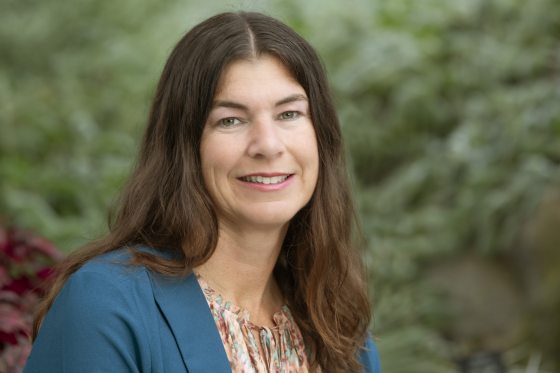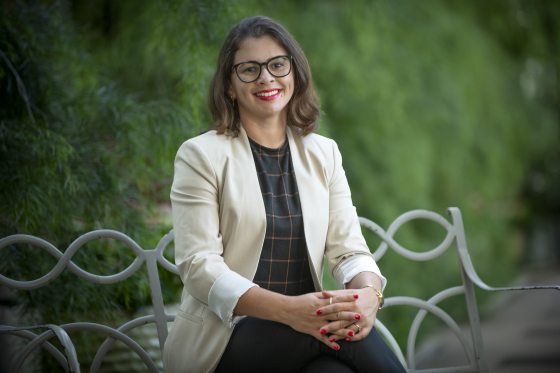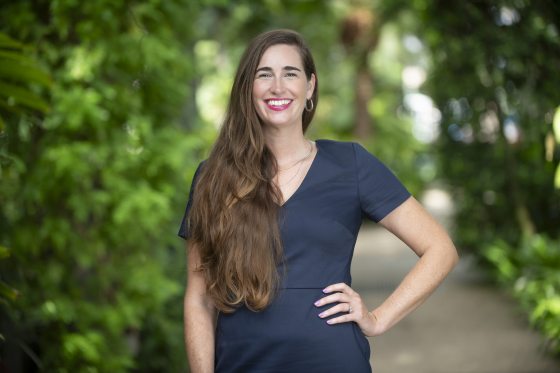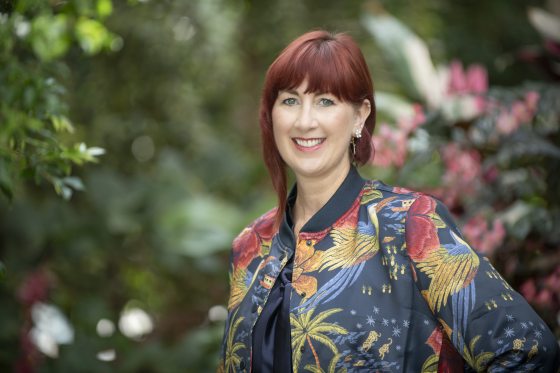At Longwood, we’re proud to offer our Fellows Program—a unique leader-development program focused on preparing high-potential professionals for high-impact roles in public horticulture. This immersive living and working experience is unlike any other and, with the recent arrival of the five remarkable individuals who make up our 2024–25 Fellows cohort, we can’t wait to see what this talented group of public horticulture professionals will learn and accomplish. Coming to Longwood from California, Florida, New Zealand, Brazil, and New York City—with varied interests and backgrounds ranging from landscape design, to plant discovery and propagation, to the intersection of education and horticulture, to enriching public gardens—our Fellows are here to change the world of public horticulture.
Laurel Dunning
Longwood has always held a special place in Laurel Dunning’s heart—and her time here as a Fellow serves as her second experience at Longwood, with the first as a design and planning intern. “As someone who has been visiting Chester County since childhood, I’ve had the privilege of seeing Longwood grow and evolve over the years. For example, as an intern I was involved in the redesign of the East Conservatory. Now I am here during such an exciting time with the new West Conservatory soon opening as part of Longwood Reimagined,” shares Dunning. “My time as a design and planning intern here after college cemented my admiration for this institution. The magic of Longwood never fades—in fact, the deeper I delve into its history, operations, and horticultural excellence, the more I am bedazzled.”
Dunning describes being part of the new Fellows cohort an extraordinary milestone in her career and as “a rare opportunity to be immersed in leadership development in a way that fuels my passion for gardens and horticulture.” Dunning enters the cohort from Hearst Castle, California’s most visited state park, where she held the position of Supervising Groundskeeper II. With a degree in landscape architecture from Cal Poly State University, Dunning has experimented with plants and design concepts throughout her career, including spending 16 years at the Madonna Inn, an eclectic resort known for its themed rooms and vibrant aesthetic.

Fellow Laurel Dunning. Photo by Carlos Alejandro.
During her Fellows experience, Dunning looks forward to delving into her primary interest: understanding organizational culture and how to foster teams that are both highly productive and exceptionally positive. “I’m eager to learn about the various ways gardens articulate and fulfill their missions and visions, especially in how they engage and educate the public. Leadership development is a key focus for me, as I aim to enhance my ability to inspire others and advocate for the importance of horticulture,” she shares.
Beyond organizational culture, Dunning has much to explore—and revisit—during her time in the Philadelphia region. “This area is brimming with horticultural treasures, and I’m eager to explore them all,” she notes. “Revisiting the gardens I first encountered 22 years ago as an intern will be like a walk down memory lane, allowing me to see how they’ve evolved over time. There are also numerous gardens I’ve yet to discover, and I’m excited to visit them for the first time.”
Vânia Pereira
For Vânia Pereira, “being part of the new Fellows cohort is a dream come true.” Growing up in rural Brazil, Pereira developed a love for plants through her mother’s beautiful garden but didn’t see horticulture as a career until coming to the US for an exchange program. While working at the Horticulture Center of Illinois State University, she discovered the crucial role botanical gardens play in communities. “Inspired to work in public gardens, I’m thrilled to return to this field via the Fellows Program after completing my Ph.D. in Environmental Horticulture at the University of Florida,” Pereira says. “My first visit to Longwood Gardens in 2019 left a lasting impression of beauty and excellence in the public garden world. I could never have imagined such an opportunity for learning, networking, and developing my leadership skills. I look forward to taking these experiences and insights back to improve our industry and make a meaningful impact.”
Pereira completed her bachelor's degree in Agronomy Engineering in Brazil and a master's in Agriscience at Illinois State University, and her previous roles include horticulturist at the Horticulture Center of Illinois State University and docent at the Harn Museum of Art at the University of Florida. With a background in academic horticulture, Pereira aims to deepen her knowledge regarding leadership and management during her time as a Fellow. “The Fellows Program will significantly broaden my expertise beyond research into strategic planning. The program is helping me to develop essential skills in team building, leadership, collaboration, and networking, while also enhancing my abilities in program planning and budget management,” shares Pereira. “This opportunity is providing me with a comprehensive background, combining my academic and research experience with valuable leadership skills, preparing me to make a greater impact in the field of public horticulture and conservation research.”

Fellow Vânia Pereira. Photo by Carlos Alejandro.
Pereira reflects on the last month of the program, citing the “opportunity to visit remarkable gardens in the region, including Chanticleer, Bartram’s Garden, Stoneleigh, and Mt. Cuba Center so far”—and looks forward to applying what she has observed and learned. “It’s a great learning experience to see the distinctiveness of each garden, particularly in observing their unique designs, management practices, leadership styles, and conservation and community engagement efforts,” she states. “It is inspiring to see how each garden fulfills its mission and offers meaningful programs and opportunities to its community.”
Anastasia Sallen
Bringing with her a background in horticulture and education—and a passion pursuing the intersections between plants and humanity—Anastasia Sallen joins the Fellows Program from Sarasota, Florida. There, she served as Associate Vice President for Education at Marie Selby Botanical Gardens, overseeing education programming across two campuses.
For Sallen, the Fellows experience is both an individual and collective experience. “Being a part of the Fellows cohort means reflecting on yourself as a leader and intentionally repacking your toolkit,” she shares. “Being a part of the Fellows cohort also means being a part of a team. One of the things I have enjoyed most is being a part of an incredibly talented group of professionals. We come from a broad range of experiences and gardens and have a lot to share with one another. I am inspired by each of the passionate and motivated women that compose our cohort. It has been a joy to travel on this journey together.”

Fellow Anastasia Sallen. Photo by Carlos Alejandro.
When it comes to her journey as a Fellow, Sallen most looks forward to “having the time, space, and resources to explore my curiosity and open myself up to new possibilities.” She also looks forward to having the opportunities to “reflect, take time to challenge my assumptions, explore new tools, and learn from experts in the field.”
To Sallen, having an array of gardens—and the professionals who work to bring each garden’s mission to life—within close proximity has been inspirational, as well as given her new ideas and perspectives—and an even stronger calling to further contribute to the public garden community. “Public gardens are so much more than beautiful spaces; they are spaces of research, conservation, sanctuary, and learning,” she says. “Public gardens inspire! I believe deeply in the power of public gardens to transform this world for the better, and I want to be a part of that work.”
Clare Shearman
In her brief time as a Longwood Fellow, Clare Shearman has been inspired by the talented individuals she has encountered thus far. As she observes, "You cannot be at Longwood without being inspired by the intricate horticulture and detailed management behind the scenes." She shares that joining the 2024-2025 cohort has proven an invaluable experience, from the insightful interview process to the immersive onboarding and exposure to diverse leadership styles. Shearman eagerly anticipates the continued connections and growth opportunities in the year ahead, firmly believing that "our individual contributions are just one small part of a much larger picture."
Shearman's interest in horticulture was fostered from a young age, as she spent her weekends working in a private garden filled with heritage roses, herbaceous borders, water features, and woodland gardens. After completing qualifications in horticulture and landscaping, she took on a gardener position at Hever Castle, a 13th-century castle and grounds with themed gardens that was once the childhood home of Anne Boleyn. This experience fueled her passion for garden design, and she went on to train at the Physic Garden in Chelsea, London, before establishing her own successful garden design business in Tunbridge Wells, Kent, for 15 years.

Fellow Clare Shearman. Photo by Carlos Alejandro.
In 2009, Shearman and her husband moved to New Zealand. She fondly recalls working at some stunning historical sites, including Government House in Wellington and the private estate of Fernside Gardens. For the past six years, she has served as the Plant Collection Team Manager at the Wellington Botanic Garden, where she has balanced maintaining the garden's historical significance with adapting to modern times, allowing her to combine her passions for history, garden design, and plant cultivation.
Shearman's lifelong immersion in the world of horticulture, from historic gardens to her own custom-tailored landscape designs, has instilled in her a deep appreciation for the power of plants to elevate the human experience and forge a stronger connection between people and the natural world. As she notes, "In today's world, gardens have become increasingly vital, serving as spaces that promote wellbeing, relaxation, conservation, and education—far more than just aesthetically pleasing open areas. The Longwood Fellows journey marks the next chapter in the pursuit of my passions for plants and connecting with people."
E. Yvette Weaver
When asked what she hopes to glean from the Fellows Program, Fellow E. Yvette Weaver can only think of one answer: “Everything that I can.” To Weaver, “having this opportunity is unique. We are examining what it means to be a leader, strategic planner, and visionary. I get to gather all of this information to help me define who I want to be and the role that I would like to play in public garden spaces.”
To date, Weaver’s horticultural journey is defined by her dedication to enriching New York City’s public gardens. As a Horticulture Supervisor at The Friends of The High Line, she oversaw the 10th Ave Square and Northern Spur sections and gave focus to cultivating and supporting the horticulture team, while utilizing her extensive prior experience garnered through nearly a decade at The Met Cloisters Gardens, the Heather Garden of Fort Tryon Park, and working as the John Nally Intern at Wave Hill.

Fellow E. Yvette Weaver. Photo by Carlos Alejandro.
Weaver’s main interests in horticulture include “the creation of beautiful spaces for all people,” which she cites as her main reason for entering the field of public horticulture. Weaver also focuses on “leveraging these public green spaces to connect people to the natural world and get them thinking about their relationship to plants, their local environment, and hopefully the bigger ideas around biodiversity.”
Reflecting on her Fellows experience to date, Weaver goes to those with whom she’s sharing the experience. “I am in a cohort of inquisitive and high-level thinking women, and I feel grateful that I am encouraged and challenged by them every day,” she shares. “I hope to share my strengths and perspective with the cohort to enrich everyone’s experience as well.”


